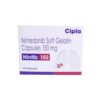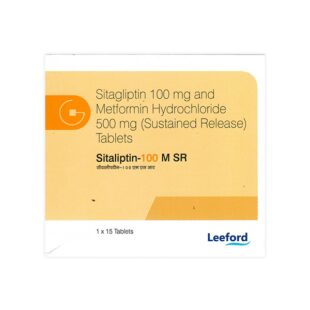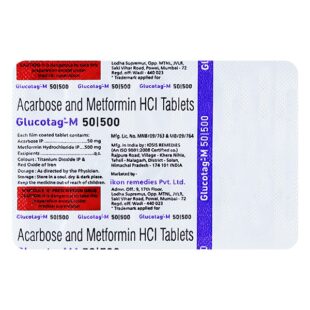- Your cart is empty
- Continue Shopping
Nintenib 100mg Capsule
Uses of Nintenib 100mg Capsule
- Idiopathic pulmonary fibrosis.
- Chronic fibrosing lung diseases with a progressive phenotype
- Systemic sclerosis
Introduction Of Nintenib 100mg Capsule
Nintenib 100mg Capsule consists of the active ingredient Nintedanib. It belongs to the medication class known as tyrosine kinase inhibitors. It treats idiopathic pulmonary fibrosis, chronic fibrosing interstitial lung disease, and systemic sclerosis-associated interstitial lung disease. Talk to your physician if you are on blood thinning medications or have recently undergone surgery. Use effective contraception while receiving this capsule and continue to use it for three months, even after receiving the final dose. Consult your doctor for effective contraception because the birth control pills may not work properly on women.
Before starting the treatment, inform your doctor if you have any medical conditions, such as liver and heart problems. Before starting the treatment, your doctor may conduct a liver function test at the regular interval of the first three months. Notify your doctor if you have a history of bleeding or blood clots (arterial thromboembolic). Nintenib 100mg may cause liver function impairment (hepatic impairment) and embryo-fetal toxicity.
Consult your doctor if you have any of these underlying conditions. The most common side effect of Nintenib 100mg is nausea, vomiting, diarrhea, fever, skin ulcer, gastrointestinal perforation, altered liver function values, and decreased appetite. headache, weight loss, hypertension. Inform your doctor immediately if you experience any side effects.
Therapeutic Effects of Nintenib 100mg Capsule
Nintenib 100mg works by inhibiting receptor multiple tyrosine kinases (RTKs) enzyme that develops and progresses lung fibrosis (scarring). Inhibiting these enzymes reduces the development of fibrous tissue in the lungs.
Interaction of Nintenib 100mg Capsule with other drugs
Inform your healthcare professional about all the medicines you take, including prescription, over-the-counter, nutritional and vitamin supplements, and herbal products. Certain medications include a P-glycoprotein (P-gp), CYP3A4 inhibitor, Ketoconazole, Anticoagulants, s St. John’s wort, Laxatives, and other drugs, interacting with Nintenib 100mg may reduce effectiveness by causing undesirable side effects.
More Information about Nintenib 100mg Capsule
- Before starting the treatment, it is recommended to perform a liver function test
- Store at the room temperature of 20°C to 25°C
- Protect from light and moisture
- Keep out of reach and sight of children and pets.
How to consume Nintenib 100mg Capsule
Take Nintenib 100mg as advised by your physician. Swallow the medicine with a glass of water. Do not crush, chew, or open the medicine. Your doctor will decide the correct dose and duration for you based on your age, body weight, and disease condition. Do not stop taking this medicineunless your doctor advises you to stop.
Safety Advices for Nintenib 100mg Capsule
Pregnancy
Consult your doctor
Nintenib 100mg is unsafe to use during pregnancy as it may cause birth defects or death to the unborn baby. Report to your doctor if you are pregnant or think you may be pregnant, or planning for the pregnancy before starting the treatment.
Breast Feeding
Consult your doctor
Taking Nintenib 100mg while breastfeeding may be unsafe because it may affect the child. Therefore, talk with your doctor to get more information.
Lungs
Consult your doctor
Consult your doctor if you experience symptoms like pneumonia or any other lung-related condition while taking Nintenib 100mg.
Liver
Consult your doctor
Inform your physician if you have liver problems because Nintenib 100mg should be used cautiously with this condition. Before starting treatment, your physician conducts the liver function test regularly for the first three months.
Alcohol
Unsafe
It is unknown whether consuming alcohol while taking a Nintenib 100mg capsule is safe. Please speak with your physician.
Driving
Consult your doctor
While taking Nintenib 100mg, it is unsafe to drive or use machines because it may cause nausea, changes in vision, vomiting, etc. Talk to your doctor for more information.
Side Effects of Nintenib 100mg Capsule
Side effects are unwanted symptoms caused by medicines. Even though all drugs cause side effects, not everyone gets them.
Serious
- Bronchitis
- Myocardial infarction
- Bleeding problems
- Pneumonia
- Major bleeding
- Yellow eyes, dark urine, pain in the upper right side of the stomach
- Severe stomach cramps, bloating, fever, and chills
- Chest pressure or pain on the left side of the body
- Increased protein in the urine (proteinuria)
Common
- Nausea, vomiting, diarrhea
- Fever
- Skin ulcer
- Gastrointestinal perforation
- Altered liver function values
- Decreased appetite
- Headache
- Weight loss
- Hypertension











Reviews
There are no reviews yet.